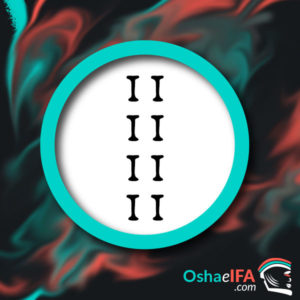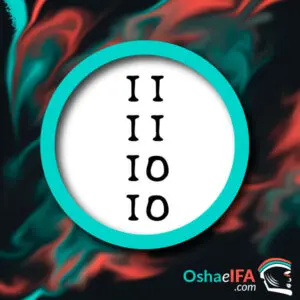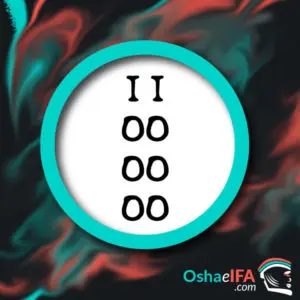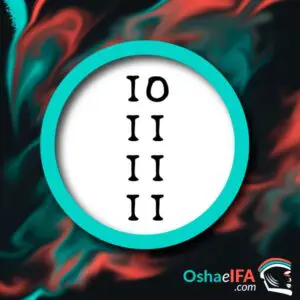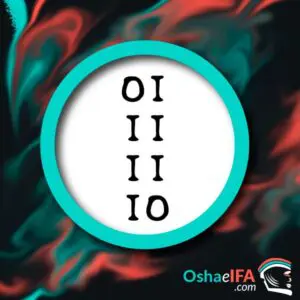Osa Kana (Osa Okana)
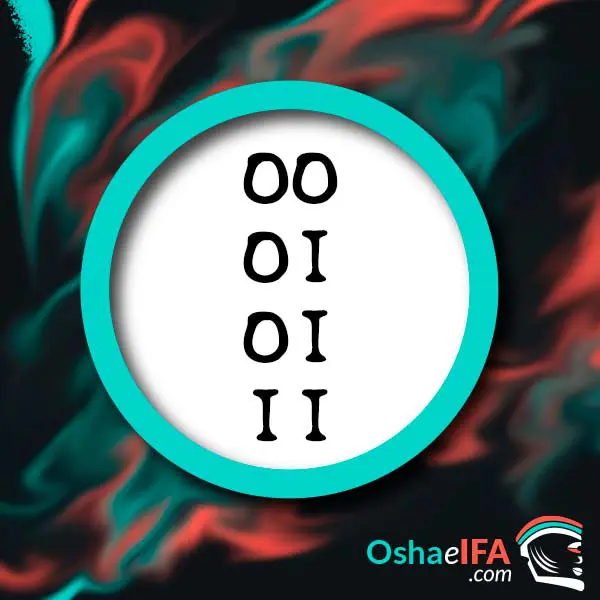
Osa Kana, is the combination of the older Odu Osa and Okanran, warns of maternal problems and resulting instability. It is crucial to receive Oduduwa and show deep respect for Oya.
Overview of the Osa Okana Ifa Sign
What is born in the odu of Ifá Osa Kana?
- The powers of the different herbs to prevent witchcraft at the doors.
- The looms, the spinning wheel and the sewing machine.
- Born: The overcoming of difficulties.
- The great power of Oya.
- The car.
- Here: Eshu is the one who breaks down the house.
- We must receive Oduduwa and Osanyin.
- You have to respect Oya a lot.
- Shango is given an acana knife.
- An acana knife is put on the Ebo.
What does the Ifá sign Osa Kana talk about?
- Pork is not eaten.
- Ogun went to the mountains so as not to kill Yemajá.
- Mark heart disease.
- Here: You can't be greedy.
- When seen in Untefá, the godfather and godson have to swear an oath in Orun.
- The woman is prohibited from having an abortion.
- Faith in the Saints is lost.
What does the Ifá Osa Okana sign mark?
- It is an Ifá of knowledge and, at the same time, it is a background Ifá.
- You must receive Orunmila.
- The Saints are not given Adimú.
- This is Obatala Iya Monkuo.
- The herbs of the Odu are: Aroma, star apple, tamarind, jiquí, jagüey, handsome amansa, change voice, atiponlá, ceiba, sage and white white.
- You cannot be greedy.
- Ayao and Obon speak.
Analysis and Interpretation of the Odu Osa Kana
Osa Kana tells us about the need for personal sacrifice to avoid adversity and ensure peace of mind on our path. This Odu, marked by extreme sensitivity to external changes, warns of the trials and tribulations that may arise in the life of the Awó and his family, including the possibility of being expelled from their jobs or homes. However, at its core, Osa Kana is an Ifá of knowledge, although it is considered secondary, not of brilliance. This characteristic underlines the importance of inner wisdom and esoteric knowledge over external appearances.
Economic Aspects:
From an economic perspective, Osa Kana implies that the solutions to our financial difficulties often lie in innovation and adaptability. The invention of the loom, the spinning wheel and the sewing machine symbolize the transformation of manual labor into more efficient processes, reminding us of the importance of adapting to new technologies and work methods. This Odu also warns against greed and excessive consumption, urging us to value what we have and use our resources wisely.
Health:
In terms of health, Osa Kana marks a susceptibility to heart disease, which can be interpreted in both the physical and emotional sense. The recommendation to wash the head with herbs as a curse remover suggests the need to cleanse our minds of negative thoughts and worries to preserve our mental and emotional health. Additionally, it warns about the dangers of ignoring the signals of our body and spirit.
Religious Aspects:
This Odu emphasizes the importance of ceremonies and offerings to the deities, especially Oya and Orunmila. Respect for these entities and compliance with appropriate rituals are presented as essential to maintain balance and harmony in our spiritual lives. The loss of faith in the saints noted by Osa Kana suggests a period of doubt and searching that may ultimately lead to a deeper and more personal understanding of the divine.
Personal Relationships (Love):
Osa Kana reveals challenges in personal relationships, including the possibility of severe conflicts that may require separation or transformation to resolve. This sign urges us to face uncomfortable truths and work toward reconciliation and peace. The mention of having two wives, one of whom dies from pride, symbolizes the consequences of decisions made out of ego and the need to face the realities of our actions and their impacts on others.
Sayings of the Sign of Ifa Osa Kana:
- What starts wrong, finish wrong.
- Eat more with your eyes than your mouth.
- Patience brought me happiness.
- If I sacrifice, I avoid mishaps and ensure peace of mind.
- When faith is lost, the soul is speechless.
«When faith is lost, the soul remains mute» underlines the essentiality of faith as a voice of the spirit. Without faith, we find ourselves in an internal silence, unable to communicate or understand the whispers of our soul, leaving us adrift in a sea of uncertainty and desolation.
Odu Osa Okana Ifa Code of Ethics:
- The Awó does not entrust his affairs to anyone.
You may also be interested: Treaty of Oddun Ifa: Osa Meyi.
Recommendations of the Ifá sign Osa Kana:
- Here you have to wash your head with curse-removing herb (lantern) and a hee-hee.
- You go out into the street and you will be in many passages; His enemies want to embarrass him.
- Your thoughts are evil, and you must be patient so as not to get lost. Three enemies want to destroy his house, and that's why his head is hot.
- There is something buried that hinders him; You have to get it out so that your luck returns. You have to take care of situations on the street. If you see someone with something that catches your attention, never think or say: "I should have had that too."
- Here you have disagreements with another person; He must make peace, because three lucks come his way.
- The only defense that the children of this Odu have is to do or receive Ifá.
- In this Odu, faith in the Saints is lost. The powers of different herbs were born to prevent witchcraft at your door.
- An Inshé-Osanyin is also prepared that serves to ward off all witchcraft.
- If this Odu appears in a woman, she should be told to receive Olokun, who cannot have abortions because she can die and, in the best of cases, lose her health forever. She has to receive Ikofafun and do Saint. Here only Orunmila can save her from her problems.
- You have to be careful of traps and give thanks to your dreams, to Obatala and Orunmila.
- In Osa Kana, Obon and Ayao speak, who were the ones who asked Oya to forgive the children of the Takua land.
- Here Obatala Iya Monkuo speaks: she is an Obatala sister of Oke and she is the Obatala of Osa Kana and accompanies all the children of this sign of Ifá and all the children of Obatala. She is Agbala's companion, who is the other foundation of Obatala's children. These two foundations live buried at the foot of a peregún bush in the patio of the house. Eight pigeons eat at the foot of the peregún bush. The doves are white.
Meaning of Oddun Osa Kana (9-1):
This Odu, "Osa Kana", indicates that the person must make sacrifices to avoid mishaps and ensure peace of mind. It is a sign especially sensitive to external changes and is considered unfavorable for both the Awó and his family. It is mentioned that the Awó could be expelled from his job, home or any place where he is if measures have not already been taken in this regard.
It is an Ifá that provides knowledge, although it is considered secondary and does not stand out for its brilliance. Eshu plays a role of decomposition in this Odu, where looms, spinning wheel and sewing machine emerged. At Odi-Ka, Oshun taught the spider to weave, and at Osa Kana, evolution led to the power loom, representing a primitive type of weaving.
This Ifá points out that the actions are misdirected: it prohibits the consumption of pork and criticizes greed and excess. He emphasizes that Adimú should not be offered to the saints inappropriately. Oya receives offerings that are then taken to the cemetery, while Ogun retired to the mountain to avoid harming Yemajá.
If the consultant is a man and has two wives, one will die due to pride and will continue to disturb him from beyond. It is recommended to offer her food to appease his spirit, especially if she was the daughter of Shango or Oya.
The holder of this Odu must perform numerous ceremonies in honor of Oya and work closely with the dead. During the consecration of an Alawo (Untefá), both the godfather and the godson must swear in Orun to prevent losses.
The ebó of this Ifá includes an ácana or júcaro knife. The collected Iyefá is placed in a bag, tied to the handle of the knife, and decorated with Shango and Oya beads, kept permanently in Shango's tray.
The owner of Osa Kana must have, in addition to the Orunmila necklace, a necklace with eight green, eight yellow and nine Oya beads in each section, which indicates a life with Orunmila and its exclusive use in significant moments.
You can read: Oyá, lady of storms and changes, warrior of the winds.
Says Ifa in the Oddun Osa Kana:
- You must recognize and control your greed; She eats more with her eyes than with her mouth.
- It is crucial to perform Ebó to prevent excesses or excessive desires for food from causing harm.
- It is essential to receive Ifá for your protection and spiritual guidance.
- You are the son/daughter of Olokun; You must honor and maintain a special connection with this deity.
- Be cautious of possible deception or traps; Be grateful for Obatala's revealing dreams and protection.
- When leaving and entering various places, remain cautious so as not to face alarming situations.
- Avoid envy and desire for what others possess; This could get you into trouble.
- Your negative thoughts can manifest and affect you; It is important to purify your intentions.
- Pride can lead to loss; A past relationship with a woman, Shango's daughter, still offers him protection from the afterlife.
- Three enemies seek to destroy his home and disturb his peace of mind; face these challenges firmly.
- Obstacles in your home, such as something buried, must be removed to attract good fortune.
- Safety in your environment is essential; Avoid eating in places where you do not fully trust.
- The practice of Ifá is your main defense against adversities; If he has debts to Shango, he must honor them to avoid chaos in his life.
- In case of past conflicts, it is important to reconcile; Seeking peace can open paths to new blessings.
- Depending on your gender, it is essential to follow a specific spiritual path: men must do Ifá, and women must receive Olokun.
Prayer of the sign Osa Kana Ifa:
OSA KANA OSARA AWO IKU ENI LORUNINLE OLOLUKOYE INTORI
SHANGO AFUSE ABEBE ORUN OSA KANA TI OYA ISITILE OSA KANA AFOYU TIE SIN
OSA KANA OFOYU AKUA IKU AFEFE.
Suggest Osa Okana:
BABA OLOFIN OMO SHANGO IYA BELEKE OYA YANZA OMO DIDE
INLE OLOLUKOYE
You may also be interested: Ifa Okana Sa Bilari sign
Ebbo of the Odu Osa Kana:
Paraldo of Osa Okana:
1 rooster, 2 black chickens, machete, 9 colored flags, house soil, person's clothing, ritual fabrics and herbs for the Paraldo, coconuts, candles, toasted corn, 2 chicken eggs, jutía and smoked fish, butter of corojo, liquor, cascarilla and a significant amount of money.
First the Ebó is performed and then the Paraldo with the rooster. The Ebó chickens are for Oya, but they are offered up to the next nine days. During those nine days, Adimú is presented to Oya, who is taken to the cemetery. The bodies of the chickens are cooked until they are golden brown, smeared with corojo butter and wrapped in colored cloth, and then sent to the bush or cemetery.
Board Ebo by the Oddun Osa Kana:
1 rooster, 2 black hens, machete, 9-color cloth, sticks, a clay pot, trap, the interested party's clothing, house soil, hutía and smoked fish, and a significant amount of money.
Before proceeding with the Ebó, the inside of the casserole is painted with nine different colors and allowed to dry completely.
The Ebó is prepared in the casserole.
The chickens, wrapped in 9 colored cloths, are taken directly to a bush. After performing the Ebó, the interested party must bathe with Ifá herbs (this is done after discarding the Ebó). Subsequently, a head prayer is performed with Obi Omi Tutu, 9 guinea peppers, jutía and smoked fish, cocoa butter, cascarilla and honey.
NOTE: In case of Ifá Osobo: To the casserole, add abundant corojo butter, a tiñosa feather, 21 marvel peppers and the following sticks: tengue, aroma, caimito, tamarind, moruro, jiquí, jagüey, amansa handsome and changes voice. To this the blood of the Oya chickens is added and what Inshé-Osanyin should be performed for the interested party is consulted. The herbs for Omiero are: white bleo, purslane, atiponlá, plantain, cotton, ceiba, sage and Cuban plantain.
You may also be interested: Oddun from Ifa Okana Meyi
Osa Kana in Traditional Nigerian Ifa.
ÒSÁ ÒKÀNRÀN
Igi nlá lo ya dina
The e bùgbé
A day fún Tèèrètè
You ò lódì enìkan nnú
Gbogbo aráyé ló ní tie nínú pitipiti
Tèèrè ò lódì eníkan nnú
Gbogbo won bá n bínúu rè
Wón ní kó rbo
À á séé mo Tèèrè?
N làá pe Eré
Tèèrè bá rubo
Wón ní ngbàtó or bá yò wón
Ó ó rií n tújúu wón ó kàn
Bí on bá tí n lo lójú Erè
Wón ó bàá ká aso sókè
Wón or mo telè gínngín ginngin
Tèèrè or bàá yò won
Won to subú lulè
Ní wá n jó ní n yò
Ní n yin àwon Babaláwo
Àwon Babaláwo n yin Ifá
Ó ní béè làwon Babaláwo tòún wí
Igi nlá lo ya dina
The e bùgbé
A day fún Tèèrètè
You ò lódì enìkan nnú
Gbogbo aráyé ló ní tie nínú pitipiti
Kín ni n pa won tí wón n kú beere?
terè
N ni n pa wón làwon n kú beer
Tere.
Ifá says anyone who dares to war against this person will simply die prematurely. He must make sacrifice but is advised not to be a detestable person. But whoever hates him, he will suffer the consequences.
It is due to a large tree that fell to the side of the road
What made us turn off to the mountain
He made divination for Tèèrè
The one who did not have any malice
But the one that everyone despised
Tèèrè does not like anybody's grudge
Yet we were all mean to him
They advised him to make sacrifice
How do we know who Tèèrè is
It is the alias of the "Viscous Barro"
Tèèrè made the sacrifice
They assured Tèèrè 'When they slip'
'You will see how much they will suffer for them having hated you',
Whenever they walk in slimy mud
They will hold your clothes
And they will walk wisely
Tèèrè will make them slip
So that they fall in one fell swoop
He began to dance and rejoice
He was praising his Babaláwos
His Babaláwos were praising Ifá
He said it was exactly what his Babaláwos had said
It is due to a large tree that fell to the side of the road
What made us turn off to the mountain
He made divination for Tèèrè
The one who did not have any malice
But the one that everyone still despises
What is it that is killing all of them?
terè
It was what was killing them
Tere.
Patakies of the Ifa sign Osa Kana:
Ogun's delay
On one occasion, Oya was preparing to offer a sacrifice to the saints and summoned Ogun to perform the ceremony. However, that day, Ogun was drunk, since he had consumed a bottle of liquor that was given to him by himself. This circumstance delayed him significantly.
Impatient with Ogun's delay, Oya, in desperation, requested Shango's help in performing the sacrifice. Shango agreed to help Oya and performed the sacrifice, but this act did not satisfy the saints, who refused to accept the offering and began to express their discontent.
The scandal generated by the dissatisfaction of the saints reached the ears of Olofin, who ordered that the ceremony be repeated correctly when Ogun was present.
Explanation:
This story teaches us the importance of patience and understanding in the face of setbacks that may come our way. Despite the frustration and urgency we may feel, rushing or seeking hasty solutions can lead to unsatisfactory results. Like Oya, who acted impulsively by not waiting for Oggun, we may find that our hasty actions do not meet expectations or required standards. Olofin's intervention, asking for the ceremony to be repeated, emphasizes that it is always better to do things well and with the right person, even when this means waiting longer than expected. In short, history reminds us that patience is a virtue that can help us avoid mistakes and ensure the success of our companies.
It was divined for the Antelope
Osa Kana was the Odu who guessed the Antelope: he was told: that he should sacrifice to avoid death, in the face of the insults he had received.
I sacrifice: a group of darts, bow and arrow, 1 rooster and 2000 cowries.
The antelope heard and did not sacrifice. He said that his horns were enough to guarantee his immunity from insults.
They said that his enemies could send him trouble from afar. He replied that it only depended on his horns.
NOTE: The person may have a heart attack.
